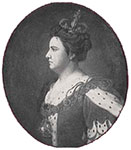|
|
Anne (1665-1714)Queen of England, Scotland, Ireland (1702-1707) |
 |
Anne was born on 6 February 1665, the second daughter of James, Duke of York, later James II. (1633-1701), and Anne Hyde, daughter of the first earl of Clarendon. At the direction of Charles II. (1630-1685), Anne and her sister Mary were raised as strict Protestants and Anne remained true to the Protestant cause and succession throughout her life. In 1687 an arrangement was undertaken to settle the crown of England on Anne, to the exclusion of Mary, on condition of Anne's embracing the Catholic faith—an arrangement that failed due to Anne's devotion to the Church of England. Thus her sister Mary (1662-1694)—who in 1677 had married William III. (1650-1702), the Prince of Orange—preceded Anne to the throne in 1689, upon the death of Mary and Anne's Catholic father, James II. Anne herself became queen of England, Scotland, and Ireland upon the death of William III. of Orange in 1702.
Through the Act of Settlement (1701), the English Parliament decided to amend the law of succession to the throne in favor of the Protestant House of Stuart. In default of heirs from William III. of Orange—who had ruled alone in England after the death of Mary in 1694—or Anne, the Act declared that the English crown would devolve upon "the most excellent princess Sophia, Electress and duchess-dowager of Hanover" and "the heirs of her body, being Protestant." Although Anne's religious convictions had committed her firmly to the principle of Protestant succession, she had no interest in cultivating a friendly rapport with her designated heirs. Thus Anne was indignant when in 1708 the Whigs expressed their wish that a member of the electoral family be invited to England. Sophie's eldest son, Georg Ludwig (1660-1727), sanctioned the question that his ambassador, Ludwig Justus von Schütz, put to the Queen's Chancellor on Sophie's behalf on 12/23 April 1714: "whether the electoral prince [Georg August (1683-1760)], as duke of Cambridge,1 should not have a writ enabling him to take his seat in the House of Lords." The writ was issued when the privy council could find no legal ground on which to refuse it. The Queen showed her displeasure by refusing to admit the Hanoverian ambassador to her court. And in response to a letter in May from Sophie and Georg August commenting upon the subject of the writ, the queen replied in an angry letter that made clear her objection to the electoral Prince's presence in London during her lifetime. The letter so distressed Sophie that it has been thought to have contributed to her death shortly thereafter, on 8 June 1714. So when Anne died on 12 August 1714, it was Sophie's son, Georg Ludwig, elector of Brunswick - Lüneburg (Hanover), who became the first Hanoverian to ascend the British throne.
![]()
Notes
1In 1706 Anne had bestowed the Garter on the Electoral Prince and had created him duke of Cambridge.
Sources
- The Encyclopædia Britannica, 13th edition. New York: The Encyclopædia Britannica, Inc., 1926.
- Aiton, E. J. Leibniz: A Biography. Boston: Adam Hilger, 1985.
- Ragnhild Marie Hatton. George I: Elector and King. Cambridge, Mass.: Harvard University Press, 1978.
Web






